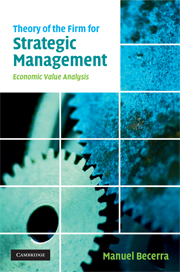Book contents
2 - The contracting view of the firm
Published online by Cambridge University Press: 05 June 2012
Summary
Coase and the nature of the firm
The contracting theory of the firm has displaced the neoclassical conceptualization of the firm as a production function and constitutes the mainstream approach to the analysis of organizations in modern economics. The defining feature of organizations is not so much the production function that they carry out (for which other institutional arrangements would be possible), but the way in which firms organize economic activity in contrast to the market. From this perspective, firms are governance mechanisms for transactions and they allocate and control resources in a manner inherently different from markets. This theory of the firm is based primarily on contracting issues that firms contribute to solve. Ronald Coase planted the seed of this approach, which was then refined and expanded by Williamson, Jensen, Hart, and other economists inspired in the notion of transaction costs and contract design.
In his classic article on the nature of the firm, Coase (1937) addressed directly the question of why there are firms in our economy. His answer comes from the apparently simple realization that exchanges can take place either inside organizations or outside the firm contracting through the market. Using a traditional optimization principle, firms would internalize those exchanges to operate more efficiently as long as the cost of doing these exchanges inside the firm is smaller than transacting through the market.
- Type
- Chapter
- Information
- Theory of the Firm for Strategic ManagementEconomic Value Analysis, pp. 27 - 55Publisher: Cambridge University PressPrint publication year: 2009



